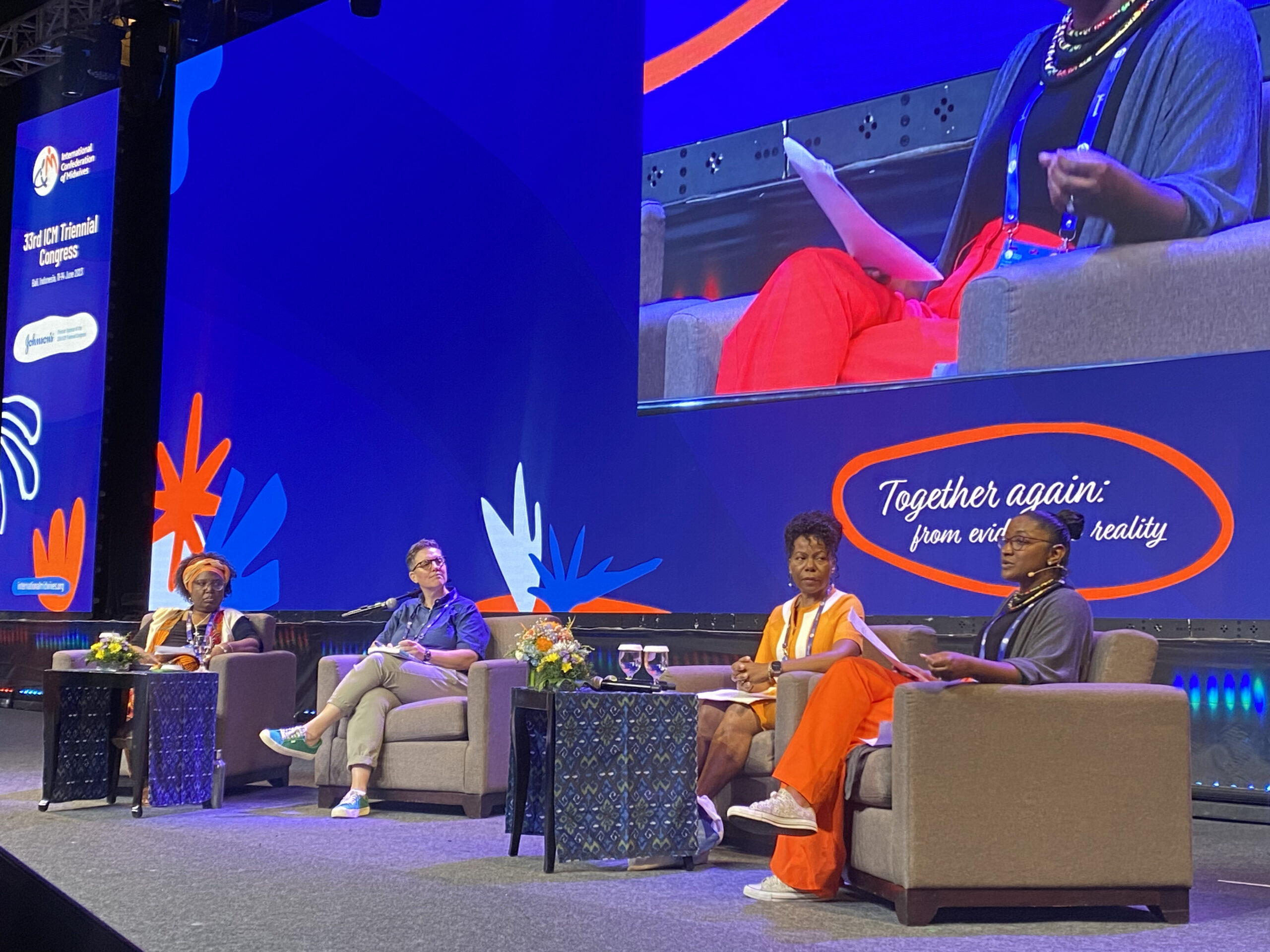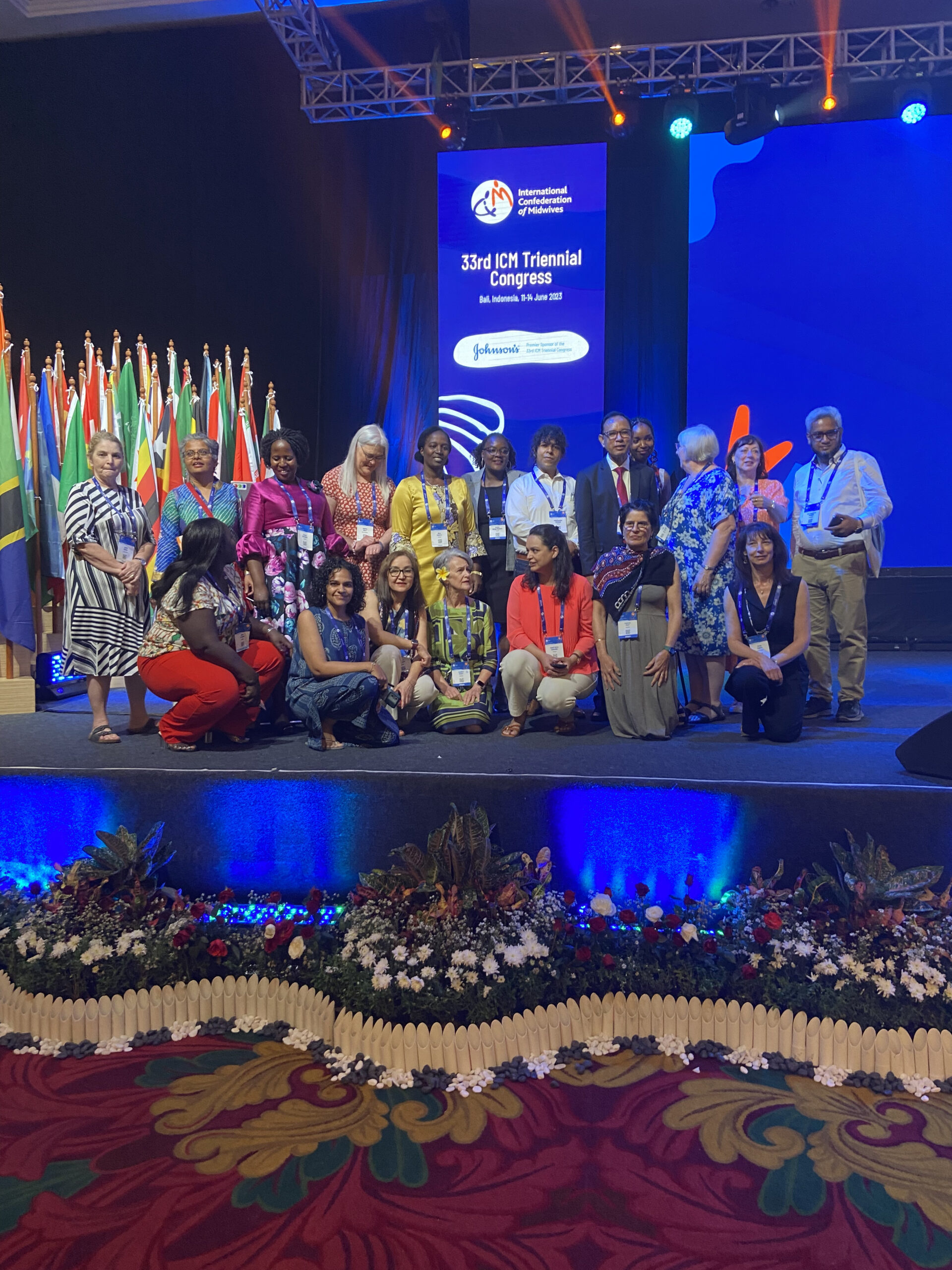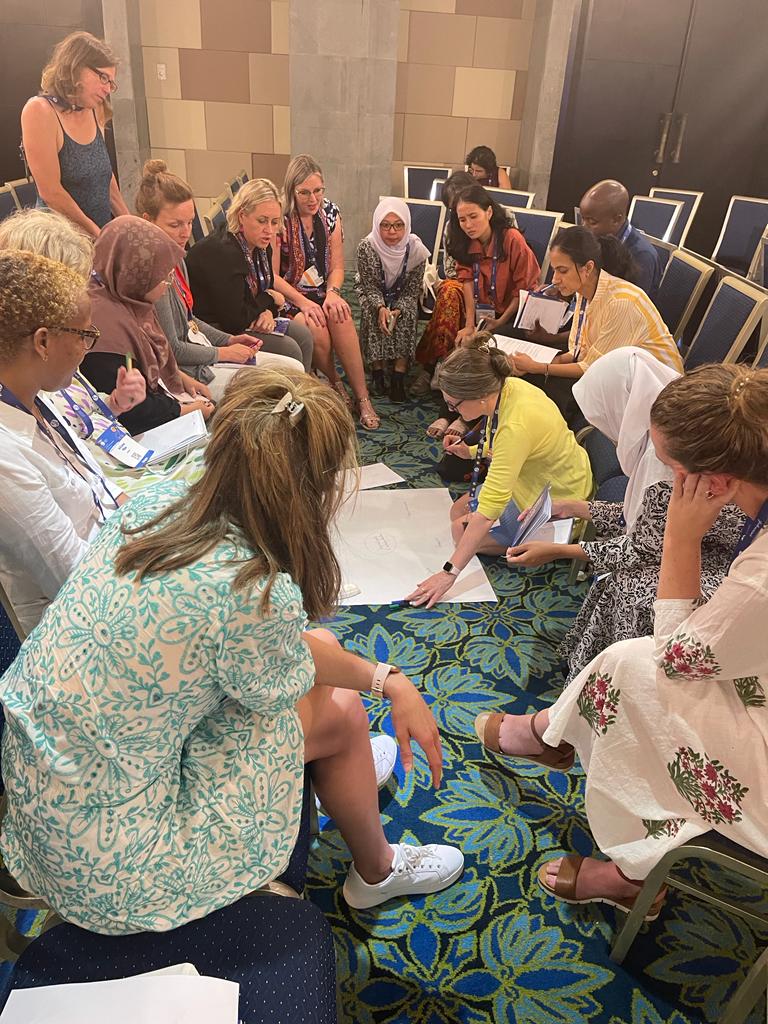Together Again: Day 1 Recap of the 33rd Triennial ICM Congress in Bali!

Following remarkable ceremonies over the weekend, which welcomed thousands of participants to Bali and opened the event with song, dance, and prayer, the ICM 33rd Triennial Congress kicked off on Monday 12 June with a series of engaging and informative sessions and workshops. First-day attendees witnessed the inaugural plenary session, which focused on realising the top demands of midwives, along with workshops and sessions covering various critical aspects of midwifery and maternal health. Here’s your daily ICM Congress 2023 recap!
Plenary Session: Realising the Top Demands of Midwives
 The highlight of the day was the first Congress plenary session, titled “Realising the Top Demands of Midwives.” Moderated by Leanne Levers of the PUSH Campaign, the session featured a diverse range of experts who shared their successful lobbying efforts to improve the compensation and working conditions for midwives, women, and other marginalised groups.
The highlight of the day was the first Congress plenary session, titled “Realising the Top Demands of Midwives.” Moderated by Leanne Levers of the PUSH Campaign, the session featured a diverse range of experts who shared their successful lobbying efforts to improve the compensation and working conditions for midwives, women, and other marginalised groups.
Jacqueline Dunkley-Bent, Chief Midwife of the ICM, discussed her role in creating progressive roles within the NHS to address inequality and amplify the voices of marginalised communities.
Juana Berinstein of the Association of Ontario Midwives shared her experience of leading an application to the Human Rights Tribunal of Ontario for pay equity for midwives, resulting in retroactive pay and compensation for injury to dignity.
Monde Imasiku highlighted her work in Zambia to champion respectful midwifery care and improve public perceptions and support through the Smile Campaign.
The session provided valuable guidance and models for delegates to pursue their own pay-equity work.
Workshop: Twinning between Midwives: An Inspirational Way of Strengthening Associations
The “Twinning Between Midwives: An inspirational way of strengthening associations” workshop—facilitated by Liselotte Kweekel and Franka Cadée, Twin to Win Project Leads—brought together over 80 participants to explore the power of twinning relationships between midwives’ associations.
The participants explored the concept of twinning and learned about the twinning toolbox developed by the project. The panel discussion featured participants who shared their twinning experiences and emphasised the importance of fostering long-term, trusting, and supportive relationships between midwives’ associations.
The workshop enhanced the organisational and technical capacity of midwives’ associations and promoted knowledge sharing.
Workshop: Midwives matter: Developing compassionate selfcare skills
 Workshop facilitators Prof. Mary Steen of the University of Northumbria, Prof. Jenny Fereday of University of South Australia, Dr. Shwikar Othman, and Prof. Annette Briley of Flinders University explored the concept of self-compassion, highlighted the connection between midwifery and self-care, and outlined steps to developing self-compassion skills to prevent compassion fatigue.
Workshop facilitators Prof. Mary Steen of the University of Northumbria, Prof. Jenny Fereday of University of South Australia, Dr. Shwikar Othman, and Prof. Annette Briley of Flinders University explored the concept of self-compassion, highlighted the connection between midwifery and self-care, and outlined steps to developing self-compassion skills to prevent compassion fatigue.
Nearly 100 midwives piled into the cozy room to meditate and let go of the stress they had accumulated in their respective lives. They left the room with strategies and tactics to cope with that stress and put their well-being first.
“We really need to think about self-compassion,” said Prof. Steen. “We must recognise our inner critic, and we really can be our own worst enemies. We need to care for ourselves so that we can care for women, babies, and their families.”
Satellite Symposium: Digital learning and hands-on practice to reach ICM Competencies: launching the ICM – Laerdal learning solution for educating midwives (ICM & Laerdal)
In this exciting session, ICM and Laerdal Global Health jointly launched the ICM Digital Competencies Learning Tool, a digital tool designed to assist midwifery students in gaining confidence and competence in essential job skills. The tool addresses the global shortage of midwives and the challenges faced by students who often lack hands-on experience during their studies. It provides students with opportunities for frequent practice, allowing them to repeatedly develop their skills until they feel competent and confident in their abilities. The tool does not assess students but creates a safe environment for learning, enabling them to make mistakes and learn from them. It is easily accessible on students’ mobile phones and provides up-to-date information.
 The tool has received positive feedback from panelists, including Brenda Zulu from Lusaka University, who expressed that students wished such a tool had been available earlier due to its impact on their learning. The tool allows students to practise independently, fostering ownership of their learning programs. Ruth Zielinski from the University of Michigan highlighted the benefit of students learning from each other, even without direct teacher observation, and emphasised the tool’s objective measurement of student knowledge against the ICM Competencies.
The tool has received positive feedback from panelists, including Brenda Zulu from Lusaka University, who expressed that students wished such a tool had been available earlier due to its impact on their learning. The tool allows students to practise independently, fostering ownership of their learning programs. Ruth Zielinski from the University of Michigan highlighted the benefit of students learning from each other, even without direct teacher observation, and emphasised the tool’s objective measurement of student knowledge against the ICM Competencies.
Swedish midwifery student Josefine Tonqvist praised the tool for facilitating reflection, discussion, and the opportunity to ask questions and make mistakes in a non-judgmental setting, ultimately increasing confidence in clinical work. Erin Ryan from ICM emphasised that the tool not only focuses on clinical skills but also helps students understand the perspective of mothers and fathers, promoting the practice of respectful care.
Workshop: Securing the Future of Midwifery (Young Midwife Leaders Workshop)
The Young Midwife Leaders (YML) and Executive Midwife Leaders (EML) presented their experiences and showcased the impact of the YML program in developing leadership among young midwives. The session highlighted the challenges faced by midwifery leaders today, including a lack of trust from policy makers.
The session included a lively debate on the topic of young midwives’ readiness for leadership, emphasising the value of understanding opponents and target audiences in advocacy.
Partner-funded Session: Midwife-led Birthing Centres in Low- and Middle-income Countries: What works and why?
 The session titled “Midwife-led birthing centres in low- and middle-income countries: what works and why?” was organised by the Bill & Melinda Gates Foundation and ICM. The session focused on a recent research project that examined the establishment and operation of successful midwife-led birthing centres (MLBCs) in low- and middle-income countries. The research team presented their findings, which identified barriers faced by MLBCs, such as limited funding, inadequate infrastructure, and lack of support for midwives. Despite these challenges, MLBCs were shown to be cost-effective and capable of contributing to universal health coverage, resulting in reduced maternal and neonatal mortality rates. The research team emphasized the importance of community engagement, trust, and recognition of MLBCs, as well as an enabling environment with supportive policies, sustainable financing models, and interdisciplinary collaboration, for the long-term success and impact of MLBCs.
The session titled “Midwife-led birthing centres in low- and middle-income countries: what works and why?” was organised by the Bill & Melinda Gates Foundation and ICM. The session focused on a recent research project that examined the establishment and operation of successful midwife-led birthing centres (MLBCs) in low- and middle-income countries. The research team presented their findings, which identified barriers faced by MLBCs, such as limited funding, inadequate infrastructure, and lack of support for midwives. Despite these challenges, MLBCs were shown to be cost-effective and capable of contributing to universal health coverage, resulting in reduced maternal and neonatal mortality rates. The research team emphasized the importance of community engagement, trust, and recognition of MLBCs, as well as an enabling environment with supportive policies, sustainable financing models, and interdisciplinary collaboration, for the long-term success and impact of MLBCs.
During the panel discussion and Q&A session, moderated by ICM Midwife Advisor Mandy Forrester, participants had the opportunity to engage with the speakers and experts. The panelists provided practical suggestions and advocacy material for those interested in developing midwife-led birthing care.
Overall, the session shed light on the potential of MLBCs in improving maternal and newborn health outcomes in low- and middle-income countries and emphasised the need for a comprehensive approach that addresses funding, infrastructure, policy, and community support to ensure the success of MLBCs.
Workshop: Midwives and advocacy: the power of stakeholder engagement in pushing for change for midwifery
The ‘Midwives and advocacy: the power of stakeholder engagement in pushing for change for midwifery’ workshop, organised by the PUSH Campaign and ICM, aimed to empower midwives by teaching them how to influence policies through effective stakeholder engagement. The workshop, facilitated by ICM Advocacy Lead Faridah Luyiga and PUSH Regional Coordinator Neha Mankani, focused on concepts such as SMART advocacy, collective advocacy, and using evidence to support advocacy efforts.
 Neha Mankani shared experiences from mobilising resources in Southeast Asia and East Africa under the PUSH Campaign. Participants engaged in discussions around stakeholder mapping, developing a stakeholder participation strategy, and policy analysis to identify opportunities for advocacy. The workshop provided attendees with valuable skills and knowledge to engage stakeholders and drive policy change for midwifery.
Neha Mankani shared experiences from mobilising resources in Southeast Asia and East Africa under the PUSH Campaign. Participants engaged in discussions around stakeholder mapping, developing a stakeholder participation strategy, and policy analysis to identify opportunities for advocacy. The workshop provided attendees with valuable skills and knowledge to engage stakeholders and drive policy change for midwifery.
Through interactive discussions and activities, the workshop fostered an engaging learning environment where midwives and midwifery advocates could reflect on their experiences and brainstorm how to implement similar advocacy activities in their own contexts. By equipping participants with stakeholder engagement skills, the workshop aimed to enable midwives to identify and leverage potential allies to advance their advocacy goals and drive meaningful change in the field of midwifery.
For live updates on ICM Congress in Bali, follow ICM on Twitter.